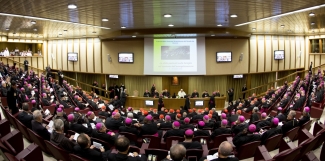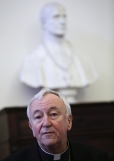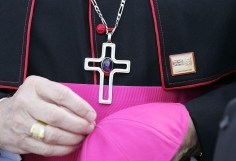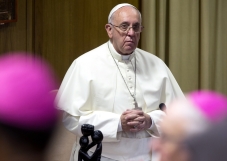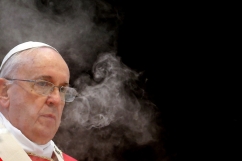The Pope is asking bishops and priests around the world to consider whether Orthodox church practice might be the best way forward to resolve the crisis over divorce and remarriage.
In the "Lineamenta" or discussion document for the final Synod on the Family, which takes place next October in Rome a year after the last one, bishops are asked to assess Orthodox Church practice.
Currently, a spouse who is betrayed by their partner through infidelity or other falsehood is unable to remarry after a civil divorce without losing access to the sacraments, including Holy Communion. This effectively excommunicates thousands of innocent men and women, who are unable to confess and be absolved, and thus be readmitted to the sacraments, while remaining in what the Church regards as an irregular marriage.
The document asks bishops to bear in mind the "distinction" between objective sinfulness and extenuating circumstances.
Bishops and cardinals are also being asked to consider whether the process of obtaining an annulment can be made easier, more affordable and even, possibly, free.
The Church teaches that marriage is for life because of Jesus' words in Matthew's Gospel, where he said: "Whoever divorces his wife, except for sexual immorality, and marries another, commits adultery."
The Eastern Orthodox Church permits two remarriages out of compassion, and in recognition of man's sinful nature. However, the second and third marriage services must low key and penitential.
The document also calls on bishops to consult their dioceses on how best to "care" for homosexuals and promote their needs in the "light of the Gospel".
The document, which has a total of 46 questions as well as a summary of the discussions at last October's meeting, sets the context for the discussions around marriage and family life at the next synod. After the bishops report back, the Office of the Synod will draw up the Instrumentum Laboris, which will be the official working document for the next meeting.
The discussion document also warns of a growing danger posed by "an exaggerated individualism that distorts family ties and ends up considering each family member as an island."
Added to this is the crisis of faith that has touched so many Catholics and that is often at the root of the crisis of marriage and the family, it says.
"One of the greatest poverties of the current culture is loneliness, the result of the absence of God in people's lives and the fragility of relationships. There is also a general feeling of impotence in the face of the socio-economic reality that often ends up crushing families," it continues, criticising the "nightmare" of poverty, unemployment and heavy taxation that militate against marriage.
It recommends specialist counselling centres in dioceses to help those who are separated, divorced and abandoned. "Forgiveness for the injustice is not easy, but it is a journey that grace makes possible," it says.
The document also emphasises that any expectation of a move towards recognising gay relationships is not on the agenda. "There is no basis whatsoever to assimilate or establish, even remotely, an analogy between homosexual unions and God's plan for marriage and family," it says. "It is totally unacceptable that the Pastors of the Church suffer the pressures in this matter and that international bodies to condition financial aid to poor countries to the introduction of laws that establish the 'marriage' between persons of the same sex."
At his general audience in Rome this week, Pope Francis said no one at the last synod questioned the Church's teaching on the indissolubility of marriage.
While thanking the media for covering the meeting, he admitted the stories read as if the event was a sporting occasion with opposing teams.
He said: "Were there fights at the synod? I wouldn't says fights, but there were strong words, yes."










